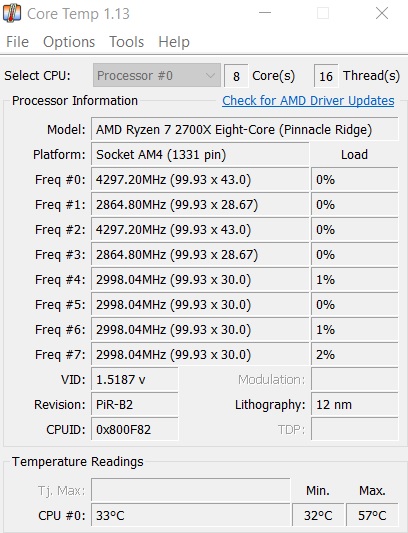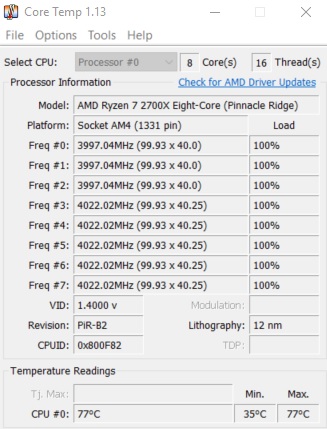If you don't follow PC hardware it might be a bit daunting to buy a new system, or even just upgrade some components. That's where this thread comes in.
I don't have time to create individual builds for every potential use case, and those would get outdated rather quickly anyway, so instead I'll just provide an overview of the market right now for each important component. If you have any specific question feel free to ask!
CPUs
In CPUs, AMD currently owns the price/performance crown in almost all segments -- the only reason to go Intel is if you need the very fastest sequential performance, or some specific features.
Suggested hardware:
RAM
With RAM, there are 2 considerations: size and speed. The latter is a function of both frequency and latency. Brands are basically irrelevant unless you are doing some extremely high-tier overclocking, and then why are you reading this beginner's guide?
Suggestions:
Mainboards
With mainboards, it's harder to provide general guidelines since it really comes down to deciding what you need. That said, these days, most people loking to play games usually don't really need anything in a mainboard other than plugging their CPU, GPU and RAM into it, and then basically everything is fine. The next-most-requested feature is overclocking, which generally means you have to step up to the highest-tier chipset. After that there are really only improvements in connectivity and more built-in hardware.
Another important consideration is size -- I list standard ATX mainboards below, but there are usually also equivalent micro-ATX models for smaller builds.
Suggestions follow (grouped by CPU manufacturer; obviously you have to get a mainboard that works with the CPU you chose). Note that I don't see a need for enthusiast tiers here; specific requirements are fulfilled by specific boards.
Storage
With storage, there are three types of devices to consider: HDDs, for large, cheap, slow bulk storage; SATA SSDs for "fast enough", not quite as large or cheap, but affordable general purpose storage; and NVME M.2 PCIe SSDs, for very fast limited (both in storage and the number of slots available) storage. Other options exist but aren't relevant for the kind of mainstream (or even high-end consumer) system we're building here.
What you choose here depends very much on the purpose of the PC you're building, here are some options:
GPUs
These are probably the single most important component for game performance, and the price spectrum of "reasonable" choices is also larger. Therefore, I've increased the number of tiers. Note that my selections for each tier are based on EU pricing,
Models don't make much of a performance difference -- read individual model reviews for noise/size information.
Suggested hardware:
Power Supplies
A decent quality power supply is a very good investment into the stability and longevity of your PC. That said, many guides on the net overstate the case for high-wattage PSUs. The power rating needs to correspond to your other specs, so e.g. if you choose a "value" build you can also get a "value" PSU, but for an enthusiast build (especially with overclocking) you should also get an enthusiast-tier PSU.
Suggested hardware:
With these components, sticking with the most affordable options in each category, you can build a very capable PC (with 16 GB of memory, 8GB of VRAM, and 1 TB of SSD storage) for ~600€. Obviously that's not very cheap, but it will run pretty much every game that exists well, and I'm not really comfortable suggesting anything below that
I don't have time to create individual builds for every potential use case, and those would get outdated rather quickly anyway, so instead I'll just provide an overview of the market right now for each important component. If you have any specific question feel free to ask!
CPUs
In CPUs, AMD currently owns the price/performance crown in almost all segments -- the only reason to go Intel is if you need the very fastest sequential performance, or some specific features.
Suggested hardware:
- Best Value: AMD Ryzen 5 2600 (150€)
- High-end: AMD Ryzen 7 2700X (300€)
Note: you can get a AMD Ryzen 7 2700 (220€) and overclock it to a very similar level as a 2700X, if you don't mind overclocking. - Enthusiast: Intel Core i9-9900K (500€)
Note: as stated above, only worth it over the 2700X for very specific use cases or if you want top-end performance independently of value.
RAM
With RAM, there are 2 considerations: size and speed. The latter is a function of both frequency and latency. Brands are basically irrelevant unless you are doing some extremely high-tier overclocking, and then why are you reading this beginner's guide?

Suggestions:
- The most basic and most important guideline: get as many RAM modules as you need to saturate your CPUs bus!
All the CPUs suggested above are dual channel, so you need (at least) 2 RAM modules. - For gaming and most workloads, I'd say the best amount of RAM to have right now is 16 GB. Outside of specialty use cases that will be enough.
- For high-end builds or lots of multitasking you might consider 32 GB. Anything above that is either vanity or you should have a really good idea why you need it (i.e. I have 64 GB so that I can keep VMs running at the same time as multiple heavyweight IDE instances, and still switch to another desktop to run a large game)
- In terms of speed, Prices currently start to increase more noticeably above DDR4-3000, so I'd stick with that for value-focused builds. Nothing over DDR4-3600 is really worth it for most anything other than bragging rights and a few percentage points in specific use cases.
- I won't name specific HW (as I said, brands are irrelevant), but here are some indications:
- Best Value: 2 Modules DIMM kit 16GB, DDR4-3000, CL16-18-18 (70€)
- High-end: 2 Modules DIMM kit 32 GB, DDR4-3600, CL19-20-20 (200€)
Mainboards
With mainboards, it's harder to provide general guidelines since it really comes down to deciding what you need. That said, these days, most people loking to play games usually don't really need anything in a mainboard other than plugging their CPU, GPU and RAM into it, and then basically everything is fine. The next-most-requested feature is overclocking, which generally means you have to step up to the highest-tier chipset. After that there are really only improvements in connectivity and more built-in hardware.
Another important consideration is size -- I list standard ATX mainboards below, but there are usually also equivalent micro-ATX models for smaller builds.
Suggestions follow (grouped by CPU manufacturer; obviously you have to get a mainboard that works with the CPU you chose). Note that I don't see a need for enthusiast tiers here; specific requirements are fulfilled by specific boards.
- AMD:
- Best Value: ASUS Prime B350-Plus (70€)
Or any other B350 board. - High-end: MSI X470 Gaming Plus (130€)
Or any other X470 board -- this tier allows overclocking.
- Best Value: ASUS Prime B350-Plus (70€)
- Intel
- Best Value: ASRock H370 Pro4 (90€)
You could go to lower-tier chipsets to save a few dozen €, but since the only reason to go Intel is to go with a decently high-end build I see no point to that. - High-end: ASRock Z390 Extreme4 (170€)
Or any other Z390 board really -- here I want for one with 2 PCIe M.2 slots and USB C.
- Best Value: ASRock H370 Pro4 (90€)
Storage
With storage, there are three types of devices to consider: HDDs, for large, cheap, slow bulk storage; SATA SSDs for "fast enough", not quite as large or cheap, but affordable general purpose storage; and NVME M.2 PCIe SSDs, for very fast limited (both in storage and the number of slots available) storage. Other options exist but aren't relevant for the kind of mainstream (or even high-end consumer) system we're building here.
What you choose here depends very much on the purpose of the PC you're building, here are some options:
- Pure gaming PC, small-medium budget: get just a single SATA SSD in a good deal, e.g. a SanDisk SSD Plus 1TB (100€)
- Pure gaming PC, large budget: add a fast NVME boot/system drive, e.g. a Samsung SSD PM981 512GB (80€)
- Content creation / storage PC: add HDDs to suit, get 2 for RAID1 if you need redundancy.
GPUs
These are probably the single most important component for game performance, and the price spectrum of "reasonable" choices is also larger. Therefore, I've increased the number of tiers. Note that my selections for each tier are based on EU pricing,
Models don't make much of a performance difference -- read individual model reviews for noise/size information.
Suggested hardware:
- Constrained budget: Radeon RX 580 (170€)
The most affordable option I'd consider generally capable. - Best Value: GeForce GTX 1660 Ti (~280€) or RX Vega 56 (~300€)
The Vega has more raw performance and 2GB more memory. The 1660 Ti is cheaper, much less power hungry, and has some NV software niceties. - High-end: GeForce RTX 2070 (460€) or GeForce RTX 2080 (670€)
- Enthusiast: GeForce RTX 2080 Ti (1100 fucking €)
There are no AMD GPUs in these tiers, because honestly, the Radeon VII series sucks and isn't competitive at its current price.
Power Supplies
A decent quality power supply is a very good investment into the stability and longevity of your PC. That said, many guides on the net overstate the case for high-wattage PSUs. The power rating needs to correspond to your other specs, so e.g. if you choose a "value" build you can also get a "value" PSU, but for an enthusiast build (especially with overclocking) you should also get an enthusiast-tier PSU.
Suggested hardware:
- Best Value: Corsair CX450 (45€)
Maybe go for the 550W model with an AMD GPU. - High-end: be quiet! Straight Power 10-CM 600W (90€)
- Enthusiast: SilverStone Strider Titanium Series 800W (140€)
With these components, sticking with the most affordable options in each category, you can build a very capable PC (with 16 GB of memory, 8GB of VRAM, and 1 TB of SSD storage) for ~600€. Obviously that's not very cheap, but it will run pretty much every game that exists well, and I'm not really comfortable suggesting anything below that

Last edited:



 )
) and yes, it is indeed, go to bed!
and yes, it is indeed, go to bed! 






